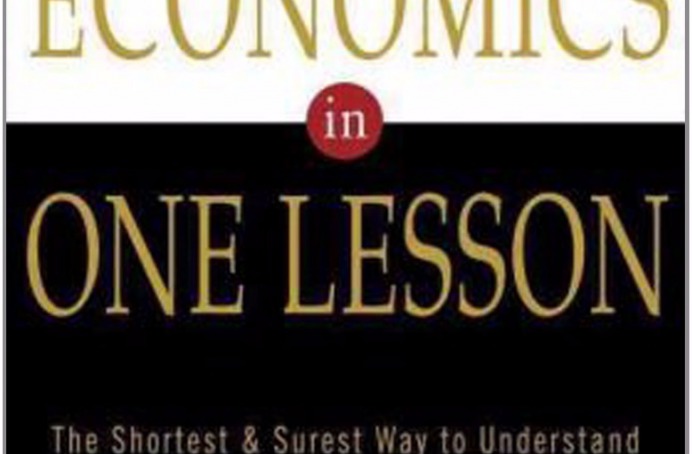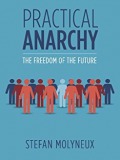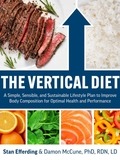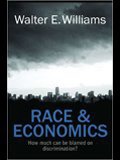Book

Economics In One Lesson
A million copy seller, Henry Hazlitt’s classic primer is an essential guide to the basics of economic theory. A fundamental influence on modern libertarianism, Hazlitt defends capitalism and the free market from economic myths that persist to this day.
Considered among the leading economic thinkers of the “Austrian School,” which includes Carl Menger, Ludwig von Mises, Friedrich (F.A.) Hayek, and others, Henry Hazlitt (1894-1993), was a libertarian philosopher, an economist, and a journalist. He was the founding vice-president of the Foundation for Economic Education and an early editor of The Freeman magazine, an influential libertarian publication. Hazlitt wrote Economics in One Lesson, his seminal work, in 1946. Concise and instructive, it is also deceptively prescient and far-reaching in its efforts to dissemble economic fallacies that are so prevalent they have almost become a new orthodoxy.
Many current economic commentators across the political spectrum have credited Hazlitt with foreseeing the collapse of the global economy which occurred more than 50 years after the initial publication of Economics in One Lesson. Hazlitt’s focus on non-governmental solutions, strong — and strongly reasoned — anti-deficit position, and general emphasis on free markets, economic liberty of individuals, and the dangers of government intervention make Economics in One Lesson, every bit as relevant and valuable today as it has been since publication.
Considered among the leading economic thinkers of the “Austrian School,” which includes Carl Menger, Ludwig von Mises, Friedrich (F.A.) Hayek, and others, Henry Hazlitt (1894-1993), was a libertarian philosopher, an economist, and a journalist. He was the founding vice-president of the Foundation for Economic Education and an early editor of The Freeman magazine, an influential libertarian publication. Hazlitt wrote Economics in One Lesson, his seminal work, in 1946. Concise and instructive, it is also deceptively prescient and far-reaching in its efforts to dissemble economic fallacies that are so prevalent they have almost become a new orthodoxy.
Many current economic commentators across the political spectrum have credited Hazlitt with foreseeing the collapse of the global economy which occurred more than 50 years after the initial publication of Economics in One Lesson. Hazlitt’s focus on non-governmental solutions, strong — and strongly reasoned — anti-deficit position, and general emphasis on free markets, economic liberty of individuals, and the dangers of government intervention make Economics in One Lesson, every bit as relevant and valuable today as it has been since publication.
aboutLiberty Portal
Liberty Portal is your gateway for free markets and free thinking. We aggregate open-sourced content to promote and popularize important people and lessons within the liberty movement.
suggested
Stefan Molyneux
Practical Anarchy: The Freedom of the Future

Imagine a world without government – this thought exercise seems impossible for many, because the power and reach of state monopolies is so omnipresent in our lives. However, there is no rational, economic or moral reason to assume that governments are necessary for the provision of roads, healthcare, charity, dispute resolution, courts, policing, national defense, jails – or any of the other services currently monopolized by the state.
Governments are extremely dangerous, responsible for over 250 million deaths in the 20th century alone – if it is possible to run a society without a government, surely this is something that we must strive towards as a species.
Practical Anarchy makes strong case for the private – that is to say voluntary – provision for public services. It reveals the idea of government as a dangerous and unnecessary anachronism, and points the way towards a peaceful and voluntary future for mankind.
Read moreGovernments are extremely dangerous, responsible for over 250 million deaths in the 20th century alone – if it is possible to run a society without a government, surely this is something that we must strive towards as a species.
Practical Anarchy makes strong case for the private – that is to say voluntary – provision for public services. It reveals the idea of government as a dangerous and unnecessary anachronism, and points the way towards a peaceful and voluntary future for mankind.
Stan Efferding
The Vertical Diet

With so many diets and programs to choose from, finding the right nutritional path can be challenging. Many modern diets are rooted in misrepresented science, rely heavily on supplements, or are just simply not sustainable in the long term.
World’s Strongest IFBB Pro Bodybuilder Stan Efferding and Dr. Damon McCune have partnered to bring you a program that sets the confusion aside and puts you on the path to weight loss, better performance, and overall better health, today. The Vertical Diet provides practical nutrition and lifestyle solutions that are simple, sensible, and sustainable.
Read moreWorld’s Strongest IFBB Pro Bodybuilder Stan Efferding and Dr. Damon McCune have partnered to bring you a program that sets the confusion aside and puts you on the path to weight loss, better performance, and overall better health, today. The Vertical Diet provides practical nutrition and lifestyle solutions that are simple, sensible, and sustainable.
Walter Williams
Race and Economics

Walter E. Williams is one of the sharpest economic minds of his generation and this book is a must read for anyone interested in having an honest conversation about race.
Read more


